“It was like living in hell”, Civil Party Says
Today, Civil Party 2-TCCP-232 (who remained anonymous due to ongoing investigations) testified about being forced to marry. He told the Court that he was not allowed to marry his fiancé and had to marry a woman he had never seen before instead. Under questioning of the Co-Prosecution, he said that former Lon Nol soldiers from the rank of colonel until second lieutenant were arrested and killed.
Forced Marriage
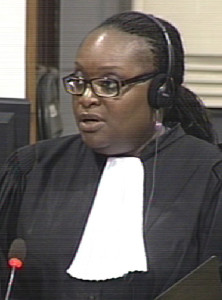
Khieu Samphan Defense Counsel Anta Guissé
Trial Chamber President Nil Nonn was still absent and was replaced by Judge Ya Sokhan. The scheduled Civil Party was sick today, so Civil Party 2-TCCP-232 was called to testify instead. First, a submission by the Khieu Samphan Defense Team regarding new documents that had been made accessible by an American university.[1] Khieu Samphan Defense Counsel Anta Guissé argued that the deadline of August 30 was too short-notice for going through the documents. No parties opposed to the Khieu Samphan Defense Team’s request.[2]
The floor was granted to the Civil Party Lawyers to put questions to the Civil Party. International Civil Party Lead Co-Lawyer Marie Guiraud inquired whether the Civil Party was married during the period of the Democratic Kampuchea regime. He replied that he was “not properly married. And I was forced to marry” in Takeo Province.
He got married in mid-1978. She presented an excerpt of one of his documents, in which he had also talked about the time period when he got married.[3] He replied that it was the beginning of the rainy season. When the country was liberated in 1975 he “was happy” in the morning. “When it was 3 pm, I became really upset when the Khmer Rouge evicted us. I saw dead bodies”. He was a student before 1975 at Takeo High School. Later, he was a policeman in Phnom Penh. “If they had been aware that I was a policeman, I would not come to testify today”, he said.
Prior to the Khmer Rouge regime, he was engaged to a woman. The woman he loved was an orphan. Her parents and his parents agreed to his proposal. “We loved each other, and we became engaged.” During the Khmer Rouge, she was in a female unit and he was in a male unit, but they could not contact each other. “The unit chiefs would not spare us. We would be smashed”, if they had love relationships. Thus, they did not see each other. The Vietnamese soldiers attacked the country. He was considered to have a good biography, since he worked hard. The chief of the unit said that “Comrade, you are mature now. Angkar wants to arrange [a] family for you. I was quiet when the unit chief told me [this]. I did not dare to refuse.”
One day, ten men and women were taken and had to face each other. When the women smiled at them, the men would be taken away and smashed. Thus, they did not dare to talk. He never proposed to marry. “Because I was a New Person, I did not have the right to speak. Only the Old People or the Base People had such a right to propose or to speak”. He was part of 47 couples. “I did not even see her, although she was standing nearby me. I was not familiar with her appearance, because I did not dare look at her. I felt so scared of my unit chief”.
One day, the unit chief wanted to meet him.[4] “The unit chief asked me: Comrade, do you want to get married? I answered: “It depends on you, Brother”. Then Ry continued the question: do you have a fiancé?” I answered: “yes”.” He was then asked by his unit chief where his fiancé worked and whether any relatives of hers had been smashed. He had replied that she was in the same mobile unit and that one brother had been smashed. Ry told him that he could not get married to someone whose relatives had been smashed. “I was so afraid that I and that woman would be killed and that my relatives would also be killed, so I gave my answer that I was the son of Angkar”. He was asked three times whether he was the son of Angkar, which he affirmed three times. “I had to agree with him. If I said otherwise, if I did not follow the instructions from him, I would be sent to prison. Therefore I had to answer like that so that I would survive”. They were told that they would get married, “because you did good jobs”.

International Civil Party Lead Co-Lawyer Marie Guiraud
Ms. Guiraud quoted his supplementary form, in which he had said that they were told in a meeting of around fifty people that they would be exterminated if they refused to get married.[5] He explained that Ry told him “long time ago”. Comrade Put was in charge of a unit and he had said that fifty males and females were “all the children of Angkar”. One of the women who had an ugly men prayed for her husband to die. One of the men who had an ugly wife did the same. When the sector chief heard about this, he had that they would be smashed “if you follow the example of those people”. The Civil Party saw skeletons in the forest.
They built two makeshift cottages or Put and the female leader of a unit. They called fifty males to stand in lines according to numbers. “They educated the men that today, all of you would be married by Angkar, and they gave instructions in many aspects. For example, you have to follow Angkar, Angkar is your parent, no one is above Angkar. And after that, they separated the fifty into groups of ten. And Ry, and other unit chiefs, were standing around the ceremony place. Then, Put, the unit chief, told to Comrade Paet – also the chief of the female unit – to bring [the women]”.
The Civil Party was part of the forty-second couple. “Some of them got their loved ones. Perhaps they had good biographies”. He himself did not know his spouse and did not dare to look at her. After he got married, the unit chiefs sent them to their respective units. The next day, the members of the units went to work. “We worked all day that day, and at night time, after we had our meal, […] Ry told us to stand along those beds. And so I did. And this female Paet brought along our wives to the rows where we were standing. Then they instructed us to go together and to find a place to sleep. The place where we going to sleep was small, but there was no choice, so I had to follow the instruction of the unit chief. And then I slept there together with my wife, but we considered one another as siblings, and I did not touch her. And of course, during the regime we were all emaciated. And nobody had any sexual feelings for one another due to the exhaustion. And since we were introduced to each other when it was night time, we could hardly recognize each other”.
Difference to Traditional Weddings
During the previous regime, the marriage ceremonies were different to the one he underwent. The respective grooms had to make an offer and to ask for permission. Relatives would be present and bless then. The bride side would look at the groom side and see whether they matched. “However, the situation was different under the Khmer Rouge. It was cruel”. He was forced to marry and no relatives were present. “And they did not have any gifts for us, but clubs and knives.” He stressed that he “really disliked” the regime. “I do not want to see such a regime return”. “Every time I think of what happened, I find it difficult to breath. And that put a lot of stress on me, emotionally and physically”. He explained “I hate myself that I was born and had to suffer through that regime”. In his marriage, “there was no love involved, at all. And it was organized according to their own thinking”.
He said that living under the Khmer Rouge, “it was like living in hell”. At this point, the President adjourned the hearing for a break.
Wedding Ceremony
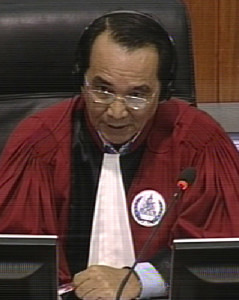
Presiding Judge Ya Sokhan
All the fifty couples were from the mobile unit. No one else participated. The age range was around 24 or 25, but “they looked old, because they were skinny”. He did not know whether men or women amongst the fifty couples knew each other before. He realized afterwards that a few had good biographies and were matched with their loved ones. When he was committed to the marriage, he did not know his spouse. He only saw his spouse more clearly the next morning. One couple was Chinese. The broom was called Try. The messenger told the chief that the “children of Angkar came to meet you”. At the commune, the chief gave the remaining food to the “children of Angkar”. The three couples were given shelter. There was a bed in the shelter. “We lived there. When we lived there, there were also the commune militiamen who came to monitor on us every night.” The commune chief also distributed cows to them. “But the cows were considered low-quality cows. I was happy to receive the cows. I took the cows to eat grass. I needed to take care of the cows well, because the cows […] were skinny”. Every time he saw his wife, they slept “deeply”, since they were exhausted from work.
His wife was called Sok Hat and was also a New Person. “Her siblings were not smashed by Angkar”. Ms. Guiraud read his Civil Party Application, in which a person called Chhan was mentioned.[6] He said that it was not his wife, but that there was a Chhan in the village who helped him.
Ms. Guiraud wanted to know whether his wife had a relationship with a man before. He replied that he did not know her background, except that she was a New Person, before he got married to her. Asked whether they were monitored, he recounted that two messengers met them regularly. When he joined the mobile unit, they monitored them once or twice. “I told them how could I have intercourse, because I was so exhausted and skinny. And people at the cooperatives who had good health, when they saw me […] they told me to eat more in order to increase energy.” Thus, he ate frogs when plowing the field.
“We had to say that we loved each other. If we said that we wanted to get separated, both of us would be killed. So we did not dare to say that we would get divorced. We had to say that we loved each other, that we would live [with] each other forever”. They were not yet reunited with their parents and siblings when the regime ended: “so we were still together at the time”. Because of the pressure of their parents and siblings “who convinced us that we should live together”, they stayed together. Their relatives told them that they should love each other and not get divorced. “Under these circumstances, it took me many days to consider this”. He had noticed that his wife “always committed good deeds toward me and my family members. Hence, he decided to stay together. They had children together. His wife became severely sick and the doctor told him that he could no longer live with her as husband and wife anymore “to produce any more children”.
Thus, he got married with another woman. He saw his former fiancé after the regime. “I took her hand and I hugged her. Each of us wept”. “We kept weeping while hugging each other. We understood each other and had a lot of good memories together […] We wished to be together, but unfortunately we were not allowed to live together. So we told each other to make good merit so that we would accumulate good merit”.
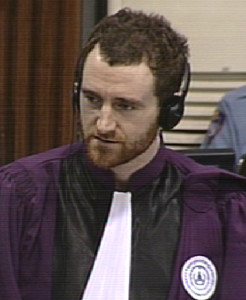
Assistant Prosecutor Cóman Kenny
The floor was granted to the Co-Prosecution. Assistant Prosecutor Cóman Kenny – it was his first day in Court questioning a Civil Party – started his line of questioning by asking what the Civil Party meant when he had said that his unit chief told him that one needed to dig out roots to dig out grass. The Civil Party explained that the unit chief told him that if he would not be allowed to marry his fiancé, since her brother had been smashed. If he married her, he also would be smashed “because the whole family would be smashed”. He submitted that handsome men were married to ugly women, educated men to uneducated women, and vice versa. Thus, some people prayed for their wives or husbands to die. “Subsequently, those unit chiefs were all killed”. This took place in Sector 33. Mr. Kenny inquired where he saw the skeleton remains. He replied that this was in an area with an “extensive lake”. They were ordered to carry dirt to build the dam. He picked lotus stems to eat, and then he met people who told him that there were many skeleton remains in an area. He himself only saw the area from afar and saw the white of the skeleton remains.
Mr. Kenny wanted to know whether having to consider themselves as husband and wives included to talk about sexual relations. The Civil Party replied that they talked about this issue and that they decided that they would say that they had sexual intercourse if they were asked. “They considered us as if we loved one another”. Mr. Kenny wanted to know what made him feel that they had to say this. He saw that they monitored them and “tried to listen” to them. Neighbors said that the couple was emaciated and that they “easily slept through the night”. If family members from both sides had been smashed, they were allowed to marry each other.
Former Policemen and Soldiers
The unit chief himself tried to search for the background of the unit members. If it was known that a member was a former soldier of policeman, “this would be noted”. Someone reported that the Civil Party was a former policeman in Phnom Penh. “However, I kept denying, and I said that I was a student and a former monk”. He was asked to recite some sermons, which he did. There was an elder Base Woman, who was also a unit chief, and she said that she knew that he was a former student or monk, and that he would be smashed if said that he was a former soldier. Another person called Suk also said that he was a former student and monk. No one else knew that he was a former policeman. “I could conceal my background’”. Former policemen and soldiers had been smashed by 1978, he said.
He was detained somewhere. He told them that they were workers. “If we told them that we were former soldiers and policemen, we would be smashed”.
Mr. Kenny wanted to know how he knew that policemen and soldiers were smashed. He said that he witnessed this himself. Lower-rank policemen and soldiers were allowed to disperse. Other ranked soldiers, including colonels, were transported “one by one” on motorbikes.
“They said that anyone who was a ranked officer from the second lieutenant to a colonel were required by Angkar in order to return to their respective offices, because it was difficult to train people to become officers. […] As a result, people succumbed to it, and they said that they were second lieutenant or colonels”. These people were subsequently detained. “Those people succumbed to the sweet propaganda by the Khmer Rouge clique.” The Khmer Rouge regime was “so immoral”. Some were very educated, he said, but “they killed their own people. […]. And they kept the good women for themselves”.
Mr. Kenny asked what happened to the people once they identified themselves as ranked soldiers. He recounted that in P’au District “at that time they did not show us that they arrested this or that person. […]. But in the end, they had all been smashed”.
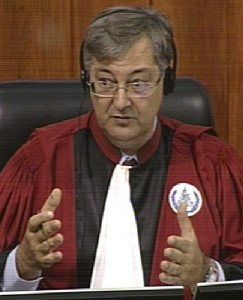
Judge Jean-Marc Lavergne
The people who instructed them to write their biographies “seemed very humble, they smiled”. Thus, “nobody ever thought that they were sent to be re-educated and smashed”. They were transported on vehicles. Around every five minutes, the motorcycles returned. “When I was in the mobile unit, I was the sole survivor”. He said that this was because he had said that he was a student. The people who identified themselves as colonels until second lieutenant were killed in B-52 crates in May 1975. He told them that he was a “reserve candidate”, but the Khmer Rouge did not understand what this was. They wrote that they wrote that he was a private in his biography. “It was the word reserve that allowed me to survive”. In the beginning, he wrote the truth when he wrote his biography, namely
that he was a reserve policeman.
Mr. Kenny then wanted to know whether he thought that they were taken away because of what they had written in their biographies. He confirmed this. He said that if he were to write his biography as a former policeman when he arrived in Takeo, he would be killed.
Confidentiality Rules
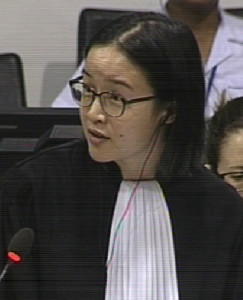
Nuon Chea Defense Counsel Doreen Chen
After the lunch break, International Co-Prosecutor Nicholas Koumjian submitted that there was no basis for the “witness” not to be mentioned by name. International Civil Party Lead Co-Lawyer Marie Guiraud pointed out that there was a difference between a Civil Party and a witness, and that this person was a Civil Party. As for the matter itself, they would rely on the Chamber’s wisdom. She highlighted that this was nevertheless not only a protective matter, but also related to ongoing investigations in Case 003 and 004. The Nuon Chea Defense Team agreed with the Prosecution and submitted that all hearings should be public as far as possible. Khieu Samphan Defense Counsel Kong Sam Onn stated that there was “nothing concerning” if the Civil Party wished it to be public. Judge Lavergne explained that this anonymity also related to maintaining the integrity of investigations. Mr. Koumjian pointed to an earlier decision and argued that the OCIJ could not impose conditions on the Trial Chamber.[7] Judge Fenz sought clarification, to which Mr. Koumjian said that he “cannot think of any reason” how this anonymity would protect the integrity of the investigation. The Trial Chamber could accept recommendations, but still had to abide by the law.
The questioning of the Civil Party then resumed, but neither the Nuon Chea nor the Khieu Samphan Defense Team had questions for the Civil Party.
Victim Impact Statement
The Civil Party then proceeded with his Victim Impact Statement:
“In 1975, I was a policeman in Phnom Penh. I hoped that I would remain a policeman serving my country, but my purpose did not materialize. I was evacuated form the city on 17 April 1975. I had so [much] suffering. After I left Phnom Penh, I suffered a lot. I slept along the road, I did not have enough food to eat. When I became sick, in Kampong Cham Province, I had a fewer and I did not have medicine to take. I picked up dao leaves and ponded them and mixed them with water and I drank them. Then I continued my journey. When I reached P’ao, I went into an office of the P’ao district military office in P’ao district. They arrested me and brought me into the office. At that place, they surrounded me. There were Khmer Rouge soldiers guarding the place for many layers of guards. I was not allowed to go outside, but fortunately, I survived. I left that detention office and I continued my journey along the road. I was evacuated from Kampong Cham to Takeo Province.
When I arrived in Takeo Province, I met my relatives. At that time, my aunt, named Yun, told me that Nat, who was a military police, and [another man], who was a marine soldiers […] both of them were taken away by the Khmer Rouge. So two of my nephews were killed. She whispered to me that “you should not talk about your background as a policeman, because your fate would be the same as Nat and Yim, so you better say that you were a student.” So I followed her advice. The next morning, another aunt of mine named Om took me to see my parents […] near a prison in Kampot Province. Over there, the Khmer Rouge village chief came to check me. He inspected my clothes […]. I had also thrown away my police ID card, so they did not cause any harm. At night time […] they came to spy on me, because they knew that I came from Phnom Penh. I was so terrified, I was so worried. “
He was detained at Ta Morn Office for half a month and was spied upon afterwards.
“Later on, they kept on spying on me. And they wanted to find reasons to kill me, because I was considered as the New Person form Phnom Penh. They constantly spied on me. At that time, there was a brother who was a villager: he told my parents to take me away from my place; that we should go back to our native homeland, otherwise our whole family would be killed, because you had a son from Phnom Penh.”
Later, he lived in a mobile unit
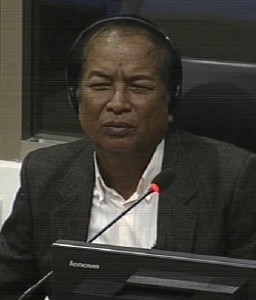
Civil Party
“They did not give me enough food to eat […] and at free time, I went to take the morning glory and I ate the morning glory raw. I did not cook it. That was when I was at the commune mobile unit. So during that time, I did not have enough food to eat. I was skinny and my health was also poor. I had a fewer.”
They did not give him proper medicine, so his mother exchanged some jewelry that she had left for some medicine so that he could recover. In District 107, he was put in a special unit. He was still spied upon and his parents were asked about his background. His parents had burned all documents about him so he could not be identified as a former policeman.
“I didn’t dare to protest. I kept on working at that location. And physically, I was weak. I was emaciated, but I didn’t dare to protest against the work given to me by the unit chief. by 1978, in around April of that year, the unit chief Ry called me to meet him and spoke about the marriage that I was forced to, as I testified earlier today. I felt so sorrowful that I could not marry my fiancé, who I loved and I wanted to live with her for life. It was like the fruit was about ripe, and then it was picked and taken away from me, and I had no right to protest against that. I felt heavy pain in my chest. And even now when I think about it, it’s beyond belief. I scolded myself: how come I was born during such a terrible period of time? And that I have to have her as a wife, but as separated from her. My love for her could not be described for her. We used to go everywhere together […] but in the end, I lost her. Although later on I was married, I still had feelings for her, and I was wondering why I was so unfairly treated. Even though I was forcibly married, I did not love my wife.”
He then recounted how his father died:
And about a few months after I got married, my father became so severely sick and he was transported by the Khmer Rouge to a hospital […] in Trean District. My fathers’ body was swollen. He was hungry, he asked for food. Then they actually used water from a big jar and injected that water into him. He had seizure and as a result he died. This adds further paint to what I had suffered. In my life I had only my father. When I lost my father and when I went to the site where he got buried, it was so painful.”
He told the court that not long after his father died, also his aunt died, and, following this, another uncle was “taken away and killed” after being accused of being a soldier.
He told the court:
“Although I am old, now I have freedom, but now it’s too late. Throughout my life I only carried the pain, sorrow and suffering”
With this, he concluded his Victim Impact Statement and was given the opportunity to put questions to the accused through the president.
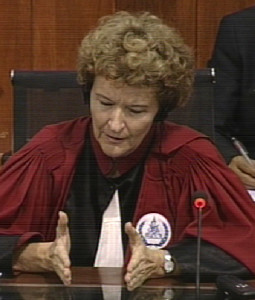
Judge Claudia Fenz
He wanted to know why the higher ranking cadres “could choose their life partners. And how could Cambodian people be deprived of such right? Second question: why [did] Angkar not allow me to marry my fiancé? She did not commit any mistake. It was her elder brother who was accused of committing a mistake against Angkar’s policy.”
Presiding Judge Ya Sokhan thanked the Civil Party and dismissed him. Judge Fenz announced that they would deliberate on the issue raised by the Co-Prosecutors.
The President adjourned the hearing. It will continue on Monday, August 29, 2016, at 9 am with the testimony of another Civil Party.
[1] E327/4/5.
[2] E3/5733, at 00850849-50 (EN).
[3] E3/4711, at answer 6.
[4] E3/4611.
[5] E3/4612, at 00938428 (FR), 00580746 (KH), 00861858 (EN).
[6] At 00942172 (FR), 00411856-57 (KH), 00810851 (EN).
[7] D309/6.
Featured Image: Civil Party (ECCC: Flickr).
